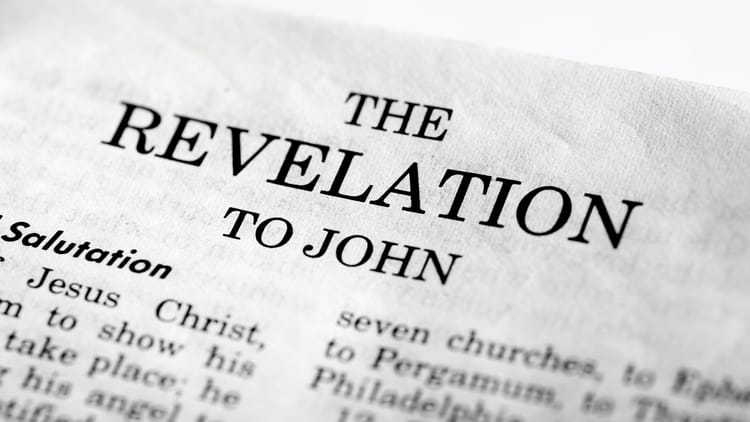The Story You Tell Yourself (Revelation 14)

Big Idea: The stories of Christ’s victory, the spread of the gospel, and final judgment should shape how you live today.
One of the most important ideas that we need to grasp is that we tell stories to ourselves about our lives and the world. Humans not only observe events but also give them meaning through the stories we tell about ourselves, others, and the world. These stories are subjective interpretations that help us understand our experiences, not objective reflections of reality. We create meaning by connecting unrelated events into cohesive stories that give structure and purpose to our understanding of life.
For instance, you lose your job. The boss calls you in on a Friday and lays you off. You will craft a story about your job loss. For instance, someone might say:
- "This is the worst thing that could happen to me," leading to feelings of despair and paralysis.
- Or, "This is the push I needed to finally start my own business," which generates hope and motivation.
- Or, "This is a normal part of today's economy. It's just business, nothing personal, which might lead to pursuing a completely different line of work."
Same circumstances, but very different ways of interpreting those circumstances and finding meaning in the world.
We are not passive recorders of life. We are storytellers. The stories we tell shape how we see ourselves and the world. Stories shape us. Stories influence how we interpret what’s going on around us. Stories help us make sense of the world. Stories become the interpretive grid by which we understand everything around us. If we’re going to live well, we need to pay attention to the stories we tell ourselves about what is going on.
This is precisely why the Book of Revelation provides narratives that guide us in interpreting history. The purpose of these stories is to help us interpret the world accurately. A better story will influence how we live and shape our lives.
Seven Histories
We're in the central part of the book of Revelation. If you've been following along, you've noticed these patterns of seven that keep repeating:
- seven seals (6:1-8:5)
- seven trumpets (8:6-11:19)
- seven bowls (15:5-16:21)
Less obvious, though, are seven histories tucked between the seven trumpets and the seven bowls. Seven complementary accounts help us tell an accurate story about the world. They also help to shape our lives.
The recipients of John's letter may have been tempted to tell themselves this story:
Look at the mighty Roman Empire – it controls everything and everyone. Our cities are dominated by pagan temples, emperor worship, and public ceremonies that mock our faith. Meanwhile, we Christians are just a tiny, powerless minority. Because we won't bow to their gods, we can't join the trade guilds or sell in the marketplaces. We're outcasts. Maybe staying faithful to Jesus isn't worth all this suffering and sacrifice.
You can see how that story would make perfect sense and would deeply influence how they lived.
That's why Revelation gives us seven different versions of history – seven better stories to help us reinterpret reality. Revelation offers a clearer view of reality, helping us align our lives with God's understanding of what is truly happening in the world.
We’ve already seen some of these histories over the past week:
- We’ve seen in chapter 12 that we’re part of a cosmic battle that began in the Garden of Eden. Satan is waging a war against God's people, but his defeat is certain, so stay faithful to the end.
- In chapter 13, we see that Satan is trying to weaken Christian faith through severe government persecution and subtle cultural influences. Stay faithful until the end.
In other words, the histories so far have taught us that history is not about the Roman Empire squeezing Christians. It’s much bigger. Satan is waging a cosmic war against God's people, using both government and subtle pressures to force compromise. Though this battle has raged since Eden, Satan's defeat is certain. Therefore, stay faithful to the end.
What is History About?
But now we get to chapter 14. Chapter 14 gives us three more histories of the world that will help us understand the world. They’re different lenses through which to view what’s happening in the world.
What is history about? History is about three things.
First, it’s about the triumph of the Lamb and his people (14:1-5)
John has just been describing the relentless attack of the dragon and his beasts. It's been bad news for two chapters. That is a true and helpful understanding of history. We need this perspective if we’re going to understand what life in this fallen world is like.
But we also need another perspective, and that’s what verses 1 to 5 give us. Instead of a dragon or a beast, we see a Lamb. “Then I looked, and behold, on Mount Zion stood the Lamb, and with him 144,000 who had his name and his Father’s name written on their foreheads” (14:1). At the center of history is not a dragon or a beast but a Lamb in heaven.
And here’s the amazing thing: the Lamb is not alone. The Lamb is accompanied by 144,000 individuals. This takes us all the way back to chapter 7, which also mentions the 144,000 who are sealed for protection by God. We saw this number is reflecting God's people, both old and new. 12 multiplied by 12, which equals 144, multiplied by 1,000 reveals the total number of God's people.
In verses 2-5, John describes a magnificent sound from heaven. The voice he hears combines the roar of rushing waters, the crash of thunder, and the melody of harps. Before the Lamb, this heavenly chorus sings a new song—the triumphant anthem of the redeemed. John describes these singers as having pure hearts, faithfully following Jesus, being redeemed by his blood, and speaking unwavering truth.
We see in Revelation 14 a glimpse of history's true course. While we currently find ourselves in the midst of a vast cosmic battle, this conflict is not the end of our story. The final chapter reveals a glorious destiny: God's followers are permanently sealed by Him, and the Lamb, not the dragon, reigns in history.
What appears as defeat in earthly terms becomes ultimate victory for God's people. Those who faced persecution, martyrdom, and apparent destruction in Chapter 13 emerge triumphant. Christ, who appeared to lose everything on the cross but ultimately triumphed, shows that his followers can also find victory through suffering. The world sees defeat, death, and loss, but reality reveals victory, resurrection, and eternal life. Just as Christ was the firstfruits of resurrection, his followers will share in His victory. Even those who lose their physical lives for his sake will experience ultimate resurrection and triumph. This shows a complete reversal of expectations: those who seem to lose everything for Christ gain everything in eternity. The "losers" in the world's eyes are the true victors in God.
Our future is secure and drawing near. Soon, we will stand with Christ on heavenly Mount Zion, singing a song that only the redeemed can understand. Despite our struggles, we will overcome this suffering and join many saved souls on God's mountain, singing a new song of salvation.
This vision reveals what will ultimately be, and strengthens us to endure what must be for now. Our present struggles fade in significance when viewed through the lens of our assured eternal triumph.
What's history about? It's about the triumph of the Lamb and his people. But it's about something else too:
Second, history is about the proclamation of the gospel (14:6-13)
Verses 6 to 13 are about three angels who bring four messages.
The first angel calls all people to fear God and worship him.
Then I saw another angel flying directly overhead, with an eternal gospel to proclaim to those who dwell on earth, to every nation and tribe and language and people. And he said with a loud voice, “Fear God and give him glory, because the hour of his judgment has come, and worship him who made heaven and earth, the sea and the springs of water.” (14:6-7)
This message urges us to honor God due to His nature and impending judgment. This command invites grace as the angel ascends to announce an eternal gospel to everyone on Earth.
The second angel announces the downfall of the wicked world system.
Another angel, a second, followed, saying, “Fallen, fallen is Babylon the great, she who made all nations drink the wine of the passion of her sexual immorality.” (14:8)
Babylon symbolizes the world's system that opposes God—a theme further explored later in Revelation. While God's people will stand victorious on Mount Zion, the great city of Babylon will crumble into ruins.
This Babylonian system manifests in every generation as a seductive worldview that contradicts God's ways. Though its pleasures and values may entice us, embracing them leads to spiritual death. True worship of God becomes impossible when we are captivated by worldly systems and values.
The message is clear and certain: Babylon's fall is inevitable. Avoid investing your life in things that are temporary and will eventually be lost. Commit yourself to what endures eternally. While every human kingdom will ultimately collapse, God's kingdom stands forever.
Next, we encounter the third angel in verses 9 to 11. The third angel announces everlasting punishment for those who worship the beast.
If anyone worships the beast and its image and receives a mark on his forehead or on his hand, he also will drink the wine of God’s wrath, poured full strength into the cup of his anger, and he will be tormented with fire and sulfur in the presence of the holy angels and in the presence of the Lamb. And the smoke of their torment goes up forever and ever, and they have no rest, day or night, these worshipers of the beast and its image, and whoever receives the mark of its name. (14:9-11)
It’s terrifying. We take no pleasure in teaching about hell, but we must not ignore it. The severity of hell's eternal punishment underscores the magnificence of salvation. This isn't to frighten you, but a reminder: those who reject Christ will face judgment, highlighting the value of salvation through Jesus.
God created you with a specific purpose: to know him personally. As humans made in his image, we were designed for relationship with our Creator. However, our sins—our wrongdoings and rebellion against God—separated us from Him. That's why Jesus Christ died on the cross as our substitute, taking the punishment we deserved. Through faith in Christ, you can receive complete forgiveness for all your sins and restore that relationship with God.
Then you have the application of this, and an encouragement:
Here is a call for the endurance of the saints, those who keep the commandments of God and their faith in Jesus.
And I heard a voice from heaven saying, “Write this: Blessed are the dead who die in the Lord from now on.” “Blessed indeed,” says the Spirit, “that they may rest from their labors, for their deeds follow them!” (14:12-13)
The application is twofold. First, persevere and endure even when it’s hard. Second, you’re blessed if you die in Jesus. Death holds no fear for those who trust in Jesus—they are blessed with eternal life. Christians endure present trials both for their future reward and, more importantly, to bring glory to God.
The good news is that while the dragon has historically waged war through two beasts, something else is occurring simultaneously. God is waging his war through the proclamation of the gospel through the Church of Jesus Christ. History isn’t just the story of a cosmic battle involving dragons and beasts. It’s about the proclamation of the gospel around the world that has eternal consequences.
What's history about? It's about the triumph of the Lamb and his people. It's about the proclamation of the gospel. It's about one more thing in this chapter:
Third, history is about two destinies (14:14-20).
The passage describes two contrasting images of God's final judgment in verses 14-20.
The grain harvest symbolizes salvation, separating God's faithful followers (the wheat) from those who reject him (the weeds). This classification exemplifies both divine mercy and judgment.
Second is the wine press—a severe image of God's wrath against evil. The text describes blood flowing from the press "as high as a horse's bridle, for 1,600 stadia" (about 200 miles). The image of blood flowing across a distance equal to Israel's length symbolizes the totality of God's judgment. Nothing will escape his perfect justice.
Mark Dever highlights that this section imparts five important truths about God's wrath. It’s personal, certain, final, horrible, and right.
- It’s deeply personal, coming directly from His character as a response to evil.
- It is also absolutely certain—no one deserving judgment will escape, and it is completely thorough.
- It's final. It's eternal and irreversible. There is no appeal.
- It is terrible. It's described as fire and a winepress, and we shouldn't downplay its seriousness.
- Finally, God’s wrath is right—it is morally just and fully reflects his perfect justice, witnessed by the holy angels and the Lamb without shame.
This reality should remind believers to stand firm in persecution and live with an eternal perspective. The final judgment will permanently divide humanity: the saved will experience eternal joy, while the others will face eternal punishment. How we live now bears eternal significance.
These metaphors show that history leads to either God's salvation or His judgment. There is no middle ground between these stark outcomes.
What is the story you’re telling yourself about the world? We all carry an internal narrative about how the world works. You may prioritize a secular view of life, emphasizing living your best possible life over your roughly 83 years. The book of Revelation presents a view of history leading to Christ's victory, stresses the need to spread the gospel, and emphasizes humanity's choice between glory and divine judgment.
The narrative you choose to believe isn't merely an intellectual exercise—it fundamentally shapes your decisions, values, and how you live. These differing worldviews provide unique perspectives on reality, and your choice between them greatly impacts how you live your life. The story you tell yourself changes everything.
The stories of Christ’s victory, the spread of the gospel, and final judgment should shape how you live today.





